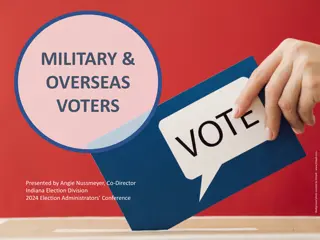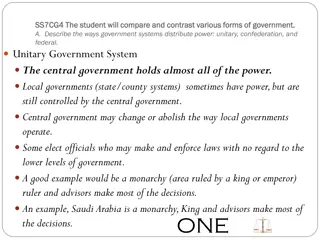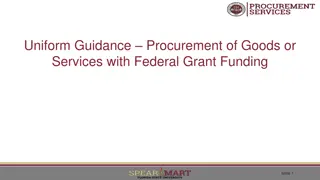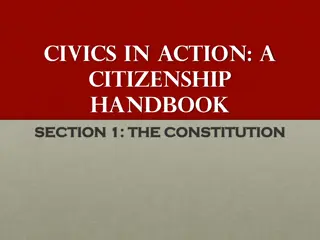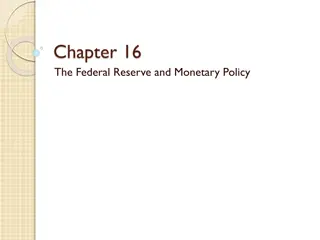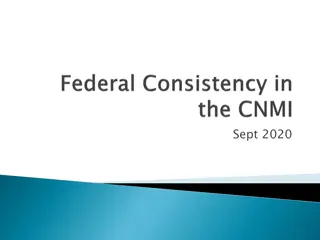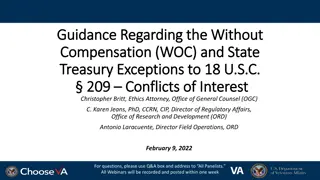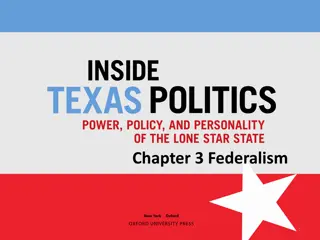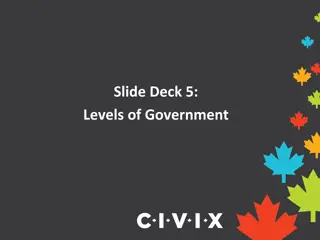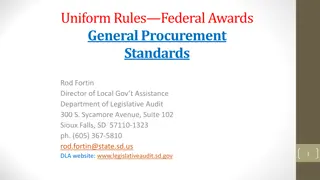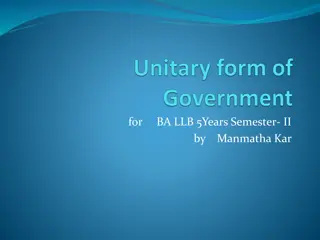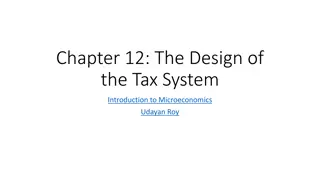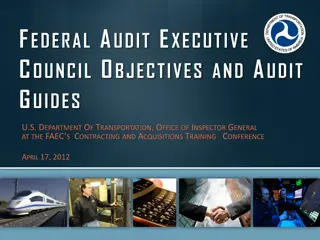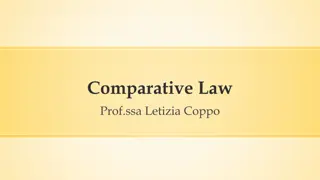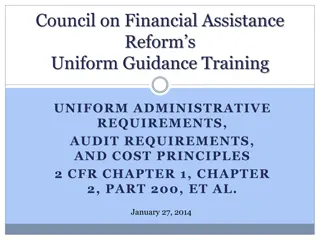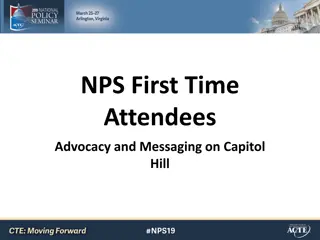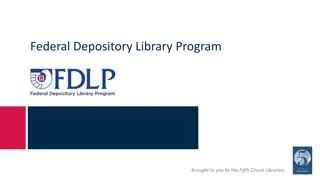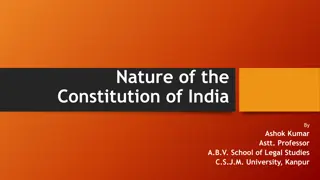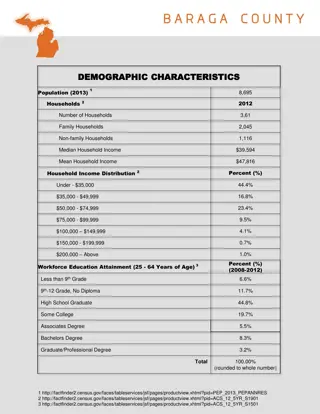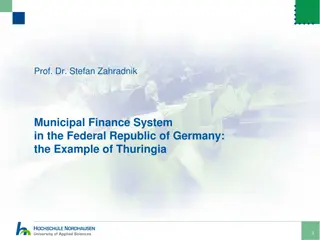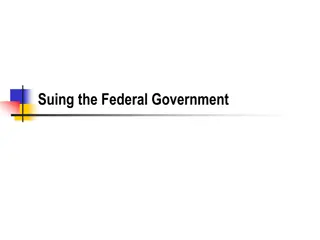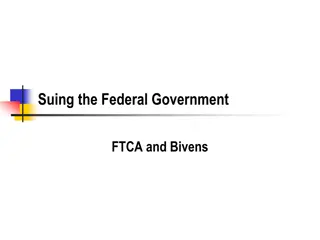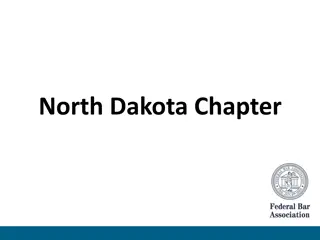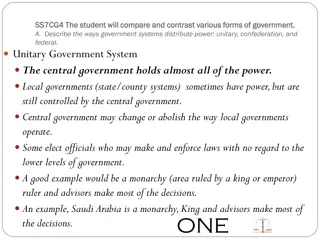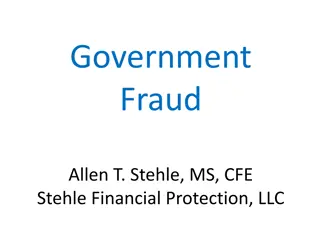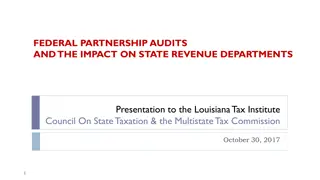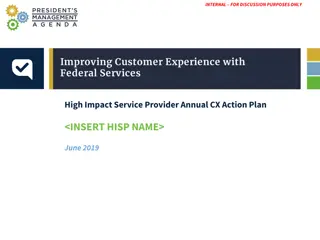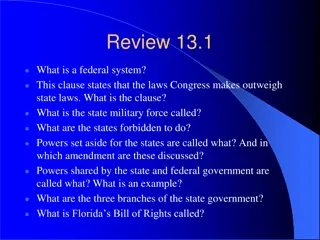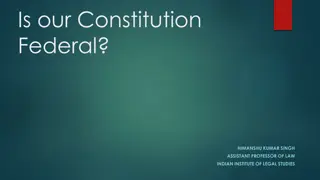Military & Overseas Voting: Special Forms and Deadlines Explained
Military and overseas voters have special forms and deadlines under the Uniformed and Overseas Citizens Voting Act (UOCAVA) and the Military & Overseas Voters Act (MOVE). These laws allow these voters to register and vote absentee in federal elections using forms like the Federal Post Card Applicati
0 views • 25 slides
Comparison of Government Systems: Unitary, Confederation, and Federal
The comparison of unitary, confederation, and federal government systems highlights how power is distributed between central and local authorities. In a unitary system, the central government holds most power, while local governments have limited autonomy. In confederation, local governments retain
0 views • 37 slides
Federal Grant Funding: Uniform Guidance for Procurement of Goods or Services
When purchasing goods or services, especially with federal grant funding, the process is subject to the Federal Uniform Guidance (UG) and University procurement procedures. The UG outlines different thresholds for procurement, such as Micro-Purchase, Small Purchase, and Competitive Formal Solicitati
0 views • 30 slides
Understanding the Foundation of US Government: The Constitution and its Principles
The Constitution of the United States outlines key principles governing the government, including popular sovereignty, republicanism, limited government, federalism, separation of powers, checks and balances, and individual rights. It establishes six goals for the US government and delineates the po
2 views • 12 slides
Understanding the Federal Reserve System and Monetary Policy
Delve into the history, structure, and functions of the Federal Reserve System, including its role in implementing monetary policy to stabilize the economy. Explore the establishment of the Federal Reserve Act of 1913, the structure of the Federal Reserve, and its pivotal role in serving the governm
0 views • 35 slides
Understanding Federal Consistency in Coastal Zone Management
This presentation serves as an introduction to Federal Consistency in the context of Coastal Zone Management, emphasizing the importance of compliance with enforceable policies outlined in the Coastal Zone Management Act. It highlights the role of the Division of Coastal Resources Management (DCRM)
1 views • 13 slides
Understanding 18 U.S.C. 209 and Its Impact on VA Research Personnel
DOJ guidance has clarified the application of 18 U.S.C. 209 to VA employees receiving compensation from non-Federal entities for research. This law prohibits Federal employees from receiving any form of compensation from non-Federal entities for services expected as Government employees. The webinar
0 views • 20 slides
Understanding the Indian Federal System
The Indian federal system as defined by the Constitution of India establishes a unique structure where power is divided between the central government and the states. This system features characteristics such as governments at two levels, division of power, a written constitution, independent judici
2 views • 19 slides
Understanding Government Support Agreements in Infrastructure Projects
Government support agreements play a crucial role in infrastructure projects by outlining various forms of support provided by the government to ProjectCo. These agreements help allocate risks appropriately, ensure credit enhancement, and provide direct or indirect support. However, hindrances such
1 views • 15 slides
Understanding Federalism in the United States
Explore the different types of governmental systems and the distribution of power between the federal and state governments. Learn about the advantages of federalism, how Texas utilizes federal funding, and the evolution of cooperation and coercion within the federal system over time. Dive into conf
7 views • 17 slides
Understanding Levels of Government in Canada
A representative democracy in Canada consists of various levels of government, including federal, provincial, municipal, and Indigenous governments. Elected representatives at each level make policy decisions and pass laws on behalf of the citizens. The federal government is led by the Prime Ministe
0 views • 18 slides
Understanding Federal Awards Procurement Standards
Explore the Uniform Rules-Federal Awards Procurement Standards under 2 C.F.R., addressing common federal findings, state versus non-federal entities, and state compliance requirements. The information provided delves into the purpose of procurement standards and the importance of adhering to federal
1 views • 48 slides
Comparison of Unitary and Federal Government Systems
This presentation compares unitary and federal government systems, highlighting differences in the number of governments, constitution type, flexibility, division of powers, supremacy of constitution, judiciary independence, and legislative structure. It explains how unitary governments have a singl
0 views • 7 slides
The Design of the Tax System: An Overview
This chapter explores the design of the tax system in the US, discussing how the government raises revenue, its efficiency, and fairness. It delves into historical perspectives, Benjamin Franklin's views on taxes, government revenue trends, federal income tax rates, and government spending. The cont
2 views • 43 slides
Understanding the Judicial Branch of the Federal Government
The Judicial Branch, as the third branch of the federal government, ensures fair law enforcement and interprets laws through criminal and civil cases. Federal courts were established to address issues of state-based justice disparities. The judiciary system comprises district courts for trials, circ
1 views • 34 slides
Federal Employment of Individuals with Disabilities Overview
This detailed content highlights the efforts of recruiting, retaining, and honoring federal employees with disabilities, focusing on Executive Order 13548 aiming to enhance employment opportunities for individuals with disabilities. It also provides historical data on disability new hires and the pe
0 views • 49 slides
Federal Audit Executive Council - Contract Closeout Guide Highlights
The Federal Audit Executive Council (FAEC) plays a vital role in coordinating issues affecting the Federal audit community, with a key emphasis on audit policy and operations. The FAEC's contracting committee has developed audit guides covering various topics like acquisition planning, market resear
1 views • 12 slides
Understanding the Federal System in American Law
The American legal system is rooted in a division of powers between the States and the Federal government. Federal law fills gaps and complements State laws, with Federal courts having jurisdiction over disputes involving different States or Federal issues. The Constitution and Bill of Rights protec
0 views • 23 slides
Understanding Federal Fund Exchange Training Program
The Federal Fund Exchange program allows Local Public Agencies to exchange federal obligation authority for state funds, reducing time-consuming federal-aid project requirements. Benefits include flexibility in project selection, wider scopes, and avoiding restrictive federal provisions. Eligible pr
0 views • 27 slides
Reforms to Administrative Requirements under Uniform Guidance Training
The Council on Financial Assistance Reform's Uniform Guidance Training focuses on changes to administrative requirements, audit requirements, and cost principles under 2 CFR Chapter 1, Chapter 2, Part 200, and more. Major changes include updates to Circular A-102, A-110, and A-89 affecting grants, c
0 views • 62 slides
Overview of Federal Advisory Committee on Insurance
The Federal Advisory Committee on Insurance (FACI) operates under the Federal Advisory Committee Act (FACA) to provide advice and recommendations to the Federal Insurance Office (FIO). The FACI Charter guides its objectives, representative members, and responsibilities, ensuring ethical standards ar
0 views • 13 slides
Advocacy and Messaging Strategies in Federal Education Policy
Exploring the importance of advocacy and lobbying in federal education policy, this content covers topics such as the legislative process, notable CTE priorities, federal funding authorization, and appropriations. It highlights the role of federal advocacy in shaping education policies, influencing
0 views • 29 slides
NARFE Membership: Protecting Federal Benefits & Enhancing Retirement Security
NARFE, the association for federal employees and retirees, is dedicated to safeguarding federal workers' benefits and providing valuable resources for maximizing their retirement savings. Through advocacy and informational resources, NARFE helps federal employees navigate changes in federal policies
0 views • 11 slides
Federal Depository Library Program: Providing Access to Government Information
The Federal Depository Library Program (FDLP) offers free government materials to libraries, ensuring public access to federal information. Established in 1813, the program disseminates resources across 1150 federal libraries, promoting transparency and accountability. Selective depository libraries
0 views • 20 slides
Overview of the Federal Structure in the Constitution of India
The Constitution of India showcases a quasi-federal system with a strong centralizing tendency, as discussed by scholars like Kenneth C. Wheare, Sir Ivor Jennings, and Dr. B. R. Ambedkar. The essential features of a federal constitution, such as division of power, supremacy of law, and distribution
0 views • 4 slides
Demographic and Government Overview of L'Anse and Baraga, Michigan
An overview of the demographic characteristics and government structures of L'Anse and Baraga, Michigan. The population, household statistics, income distribution, and workforce education levels are highlighted for L'Anse. The city government structures of L'Anse and Baraga, including village truste
1 views • 10 slides
Municipal Finance System in the Federal Republic of Germany: Thuringia Example
The presentation outlines the municipal finance system in the Federal Republic of Germany, using Thuringia as an example. It covers tax revenue, key allocations to municipalities, fiscal equalization, and the structure of the federal and state governments. Various taxes, including federal, municipal
0 views • 12 slides
Overview of Federal Government Suing and Court Procedures
Explore the history and procedures related to suing the Federal Government, including the establishment of the Court of Claims, the Federal Tort Claims Act, and notable cases like Dalehite v. U.S. Learn about the challenges posed by private bills, jurisdiction of the Court of Claims, and negligence
0 views • 44 slides
Federal Reporting Entity Update: Highlights from FASAB Review
Explore the latest updates from the Federal Accounting Standards Advisory Board (FASAB) review, including insights on the reporting model, risk considerations, assumed leases, and public-private partnerships. Learn about the significant changes in federal financial reporting entities and the impleme
0 views • 25 slides
Overview of Suing the Federal Government: FTCA and Bivens
This informative content delves into the history of sovereign immunity in the U.S. Constitution, the formation of the Court of Claims in 1855, its jurisdiction over contracts and takings, the Federal Tort Claims Act (FTCA), and a specific case involving negligence by the United States in the shipmen
0 views • 37 slides
Federal Bar Association: Strengthening the Legal System
The Federal Bar Association (FBA) is dedicated to enhancing the federal legal system and promoting justice through its support of federal practitioners, the judiciary, and the public. With over 17,000 members nationwide and a strong focus on community engagement and professional development, the FBA
0 views • 15 slides
Comparison of Unitary, Confederation, and Federal Government Systems
The unitary government system centralizes power in the central government, confederation delegates power to local governments, and federal shares power between levels of government. Examples like Saudi Arabia (unitary), confederation (decentralized power), and the USA (federal) showcase these system
0 views • 36 slides
Understanding Single Audit Requirements for Hawaii Child Nutrition Programs 2016
In accordance with federal regulations, non-Federal entities that expend $750,000 or more in Federal funds, including USDA's child nutrition programs, are required to undergo a Single Audit. The audit must be completed within nine months of the organization's fiscal year-end, and the final report mu
0 views • 5 slides
Federal Government Job Application Tips
Discover job opportunities in the federal government across various sectors such as economics, finance, and analysis. Learn how to navigate the application process efficiently, including crafting concise cover letters and tailored resumes to stand out to hiring managers. Find out about specific agen
0 views • 22 slides
Understanding Government Fraud: Impacts and Prevention
Government fraud is a serious issue that impacts public trust and financial stability. This type of fraud involves intentional acts to deceive the government and can occur internally or externally. The public perception of government organizations is affected by fraud, and entities such as the U.S.
1 views • 50 slides
Understanding the Hierarchy of Lawmaking in Government
Laws are made through legislatures at different levels of government, including federal, state, and local bodies. Each level has varying degrees of power and scope in creating and enforcing laws. In case of conflicting laws between state and federal governments, the Supremacy Clause of the Constitut
0 views • 21 slides
Understanding Federal Partnership Audits and Their Impact on State Revenue Departments
The presentation discusses the impact of federal partnership audits on state revenue departments, emphasizing how states benefit from federal audit efforts. It covers topics such as reporting federal audit adjustments, the background of federal audit adjustments, and the final determination process.
0 views • 51 slides
Enhancing Federal Customer Experience Strategy
Improving the customer experience with federal services is crucial for efficiency and public satisfaction. This article discusses the need for government services to match private sector standards, highlights key areas for improvement in customer experience functions, and showcases examples of high-
0 views • 7 slides
Overview of State Government and State Legislatures in Florida
A federal system is a political framework where power is divided between a central government and individual states. In this system, laws created by Congress take precedence over state laws. The supremacy clause enforces this hierarchy. States are prohibited from actions like declaring war or mintin
0 views • 12 slides
Understanding the Federal Features of the Indian Constitution
The Indian Constitution exhibits a unique blend of federal and unitary characteristics, termed as quasi-federal. This constitutional setup grants power to both the center and states, yet allows for central intervention in certain circumstances. The Parliament holds authority over creating new states
0 views • 4 slides
